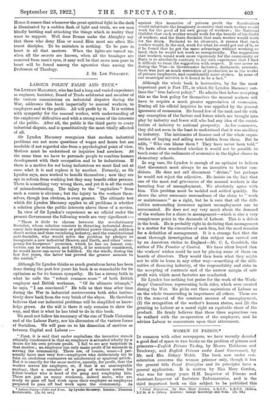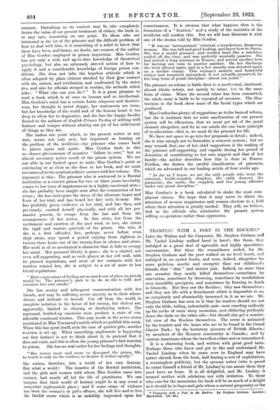WOKEN IN PRISON.*
IN common with other newspapers, we have recently devoted a good deal of space to two books on the problem of prisons and prisoners—English Prisons To-day, by Messrs. Hobhouse and Brockway, and English Prisons under Local Government, by Mr. and Mrs. Sidney Webb. The book now under con- sideration concerns the woman prisoner only, though it has the general title Penal Discipline and its principles have a general application. It is written by Miss Mary Gordon, who was for many years H.M. Inspector of Prisons and .Assistant-Inspector of Inebriate Reformatories, and is the third important book on this subject to be published this • Penal Discipline. By Miss Mary Gordon, L.R.C.P., L.R.C.B. (Edina. L.F.R. & S. ((Bas.). London: George Routtedge and Sons. Vs. 64..1
summer. Disturbing as its content may be (she completely denies the value of our present treatment of crime), the book is, at any rate, reassuring on one point. To those who are interested in the lot of the prisoner and the difficult problem of how to deal with him, it is something of a relief to know that there have been, and hence, no doubt, are, women of the calibre of Miss Gordon employed in prison inspection Miss Gordon has not only a wide and up-to-date knowledge of theoretical psychology, but also an extremely shrewd notion of how to apply it and a considerable knowledge of foreign prison con- ditions. She does not take the hopeless attitude which is often adopted by plain citizens shocked by their first contact with sin, sorrow, and retribution and confronted by the status quo, and also by officials steeped in routine, the attitude which asks : "What else can you do ? " It is a great pleasure to read a book which is at once so human and so intellectual. Miss Gordon's mind has a certain Latin crispness and decisive- ness, her thought is never sloppy, her statements are terse, but her knowledge of the world and of tho human heart is too deep to allow her to dogmatize, and she has the happy faculty denied to the authors of English Prisons To-day of writing with balance and temper without abating one jot of her indictment of things as they are.
She makes one point which, to the present writer at any rate, seems not only new, but important as bearing on the problem of the recidivist—the prisoner who comes back to prison again and again. Miss Gordon finds in this no chance phenomenon of negative "failure to cure," but an almost necessary active result of the prison system. We are not able in our limited space to make Miss Gordon's point as convincing or as clear as she does in her book, and we must recommend to the sceptical a direct contact with her volume. The argument is this : The prisoner who is sentenced to a Borstal institution or a convict prison for two or three years inevitably comes to her term of imprisonment in a highly-emotional state ; she has probably been caught soon after the commission of her crime ; she has undergone the stress of the alternate hopes and fears of her trial, and has heard her fate with dismay. She has probably given evidence at her trial, and has then, and previously, exerted herself physically, and with all her per- suasive powers, to escape from the law and from the consequences of her action. In this state, hot from the excitement and exertion of the past week or two, she enters the rigid and austere quietude of the prison. She who, if she is a first offender, has, perhaps, never before even slept alone, may spend a period varying from eighteen to twenty-three hours out of the twenty-four in silence and alone. Her work is of so mechanical a character that it fails to occupy her mind. Her personal liberty is gone ; she is a chattel, not even self-supporting, and as each glance at her cell wall, with Its printed regulations, and most of her contacts with her warders remind her, she is subject to a set of more or less trivial regulations.
"Here expressions of feeling are as much out of place as pistols would be. The prisoner's part is to do as she is told and consume her own smoke."
She has scanty and infrequent communication with her Friends, and may bo suffering severe anxiety as to their where- abouts and attitude to herself. Cut off from the world, in complete isolation in the house of her enemy, her choices are, apparently, limited to obeying or disobeying orders. The repressed, bottled-up emotions soon produce a state of con- siderable emotional tension. This may result in the nerve storm mentioned in Miss Townsend's article which we publish this week. When this has spent itself, or in the case of quieter girls, another reaction is set up. When something unpleasant is happening our first instinct is not to think about it, to pretend that it does not exist, and this is often the young prisoner's first reaction to prison. She has no real outlet for her feelings and thoughts.
"She comes more and more to disregard the prison life, to touch it only on the surface, to despise it rather openly."
She retires, therefore, into a world of her own fantasy. But what a world ! The inmates of the Borstal institution, and the girls and women with whom Miss Gordon came into contact, had nearly all led the life of prostitutes. We can imagine that their world of fantasy might be in any event a somewhat nightmarish place ; and if some crime of violence has been the woman's or girl's offence, she will live and re-live the fateful scene which is so indelibly impressed upon her
consciousness. It is obvious that what happens then is the formation of a "fixation," and a study of the statistics of the recidivist will confirm this. But we will here illustrate it with one of the stories told by Miss Gordon.
"B. was an 'international ' criminal, a treacherous, dangerous woman. She was tall and good-looking, and know how to charm. She was a model prisoner, and worked hard like a machine, smiled all the time, and was per ectly mentally passive. She had served a long sentence in France, and served another here for inciting one man to murder another. On her discharge she went abroad again, and in a few months was arrested again on a similar charge. This woman's sadistic and homicidal wishes had remained untouched, if not actually preserved, by her long term of penal discipline—about ten years. '
The prisoner on release is liable then to a mechanical, irrational, almost idiotic return, not merely to crime, but to the same
form of crime. When the second crime has been committed, the whole story is liable to be repeated ad nauseam. The illus- trations in the book show some of the facial types which are produced.
Miss Gordon has plenty of suggestions as to the basis of reform, but she is insistent that no mere amelioration of our present system will be efficacious, that we must get rid of the penal element altogether, and fix in our minds the one basic principle of re-education—that is, we must fit the prisoner for life.
We have not space to go into her proposals in detail ; indeed, she is wise enough not to formulate a concrete system ; but we may remark that one of her chief suggestions is the making of the prisoner self-supporting, and capable during her period of detention of contributing to her own support and that of her family—the author describes how this is done in France.
Further, she desires the careful classification of prisoners, which we advocated in our leading article of four weeks ago.
"As far as I know, we are the only people who treat the criminal, feeble-minded, drunken, the early dement, the paranoiac, the senile, the crippled, and the young offender under one penal discipline."
Miss Gordon's is a book calculated to shake the most com- placent citizen. We hope that it may serve to direct the attention of women magistrates and women electors to a field where their attention is greatly needed. They will, we believe, find in the officials who administer the present system willing co-operators rather than opponents.



































 Previous page
Previous page